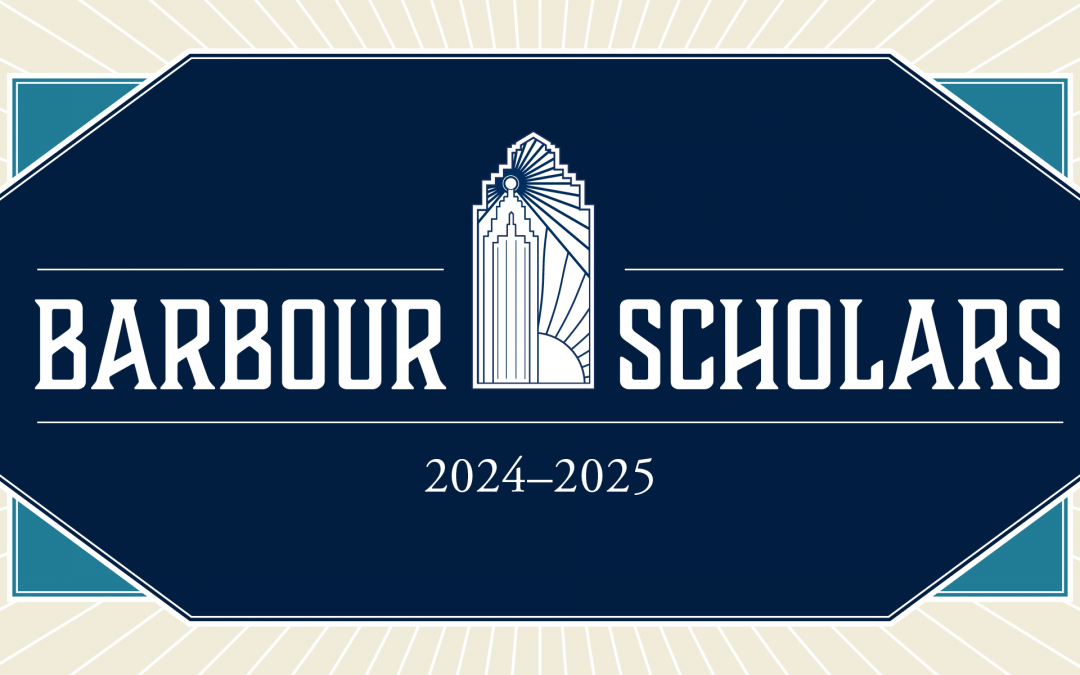We are proud to announce the 2024–2025 cohort of Barbour Scholars. Established by Levi Barbour in 1917, the Barbour Scholarship supports women from Asia and the Middle East who have come to the University of Michigan in pursuit of an advanced degree. This year’s cohort marks 107 years of academic excellence across a breadth of disciplines, and we are excited to welcome them to a global community of women leaders.
Rackham Graduate School welcomes the following students into the prestigious Barbour community:

Xinyue Chen
Ph.D. Candidate, Computer Science and Engineering
My Work
Recent technological advancements have led to an increasing use of synchronous communication platforms, such as FaceTime and Zoom. While these platforms have developed rapidly, they have led to increased misunderstanding and suboptimal collaboration outcomes due to insufficient grounding among conversation partners. Artificial intelligence (AI) applications have shown great promise in generating meeting minutes and assisting in brainstorming. But the implementation of these AI-mediated communication tools has not been without challenges, as overreliance on AI risks compromising human creativity and engagement, as well as creating opportunities for potential bias and error.
To better understand Al’s role in human-human communication in synchronous meetings and other channels, my work is to investigate and define the role of AI in human communication. I also developed AI-assisted interactive systems to promote collaboration in synchronous meetings. My work can inform the design and development of AI-mediated communication systems that can support more efficient, reflective, and transparent team collaborations in both workspace and educational use.
The Impact of the Barbour Scholarship
I am deeply grateful for being selected as the recipient of the Barbour Scholarship. The generous support from the Barbour Scholarship will allow me to further explore how AI can be used to improve communication and collaboration in synchronous meetings and other channels. It’s a stepping stone to achieving a vision where technology seamlessly integrates into human processes to augment collective intelligence and equity in collaborative settings.
The scholarship enhances my credibility within the academic community, opening doors to collaborate with many peers within the Barbour Scholars communities and other scholars in the fields of human-computer interaction and cognitive science. These collaborations are essential for multidisciplinary research that pushes the boundaries of current knowledge.
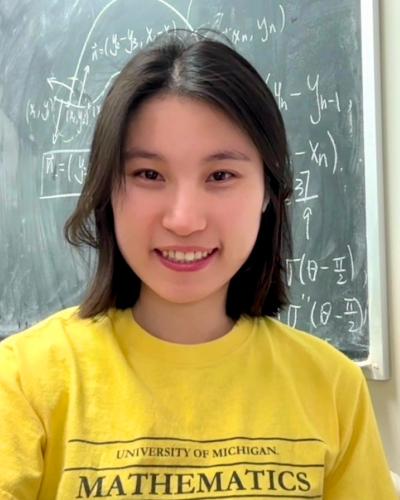
Jiajia Guo
Ph.D. Candidate, Applied and Interdisciplinary Mathematics
My Work
My research path and dissertation are structured around a variety of numerical methods for simulating interface motion, more specifically, motion by mean curvature with different settings. Throughout this journey, we have explicitly identified and formulated the connection between two elegant algorithms: threshold dynamics and median filters, widely used by different groups of researchers for decades. The discovery of this connection has enabled us to eliminate a disadvantage of threshold dynamics by utilizing the associated median filters scheme. It also allowed for the median filters scheme to be revisited and further developed in light of recent advances in the threshold dynamics method. We are adapting this algorithm to simulate more complicated and realistic multiphase interfacial motions, thereby aiding scientists from various research areas in better modeling, understanding, and explaining the laws governing these motions. Concurrently, we are dedicated to providing rigorous mathematical analysis, which ensures some sense of convergence for the solutions under these settings.
The Impact of the Barbour Scholarship
The Barbour Scholarship enables me to focus primarily on my dissertation to advance the use of median filters for simulating multiphase interfacial motions and extend the boundaries of convergence theories for numerical solutions under specific settings. The recognition represents more than mere personal success; it also serves as encouragement for girls and women who, like me, grew up in small, underdeveloped towns to pursue academic careers and work toward making our world a better place.

Chesta Jain
Ph.D. Candidate, Molecular and Integrative Physiology
My Work
Colorectal cancer (CRC) is the second most diagnosed cancer globally, and the improvement in its five-year survival rate is primarily due to advancement in diagnosis tools. CRC cells sequester high intracellular iron which is toxic for non-cancerous cells. My research focuses on identifying the metabolic pathways that render protection to the CRC cells against high cellular iron. Identifying and targeting these pathways can induce synthetic metabolic vulnerabilities, which can be further exploited for therapeutic intervention.
The Impact of the Barbour Scholarship
The Barbour Scholarship will provide crucial financial support in the final year of my Ph.D. as I work toward publishing my findings and defending my Ph.D. dissertation thesis in the summer of 2025. My long-term goal is to establish a research lab focusing on tumor metabolism and identifying therapeutic value by targeting these pathways. The Barbour Scholarship will open several new opportunities for me as I prepare for the next stage of my research career.

Seonyoung Park
Ph.D. Candidate, Environmental Health Sciences
My Work
My research focuses on investigating the effects of environmental chemical exposures—particularly plasticizers, flame retardants, and air pollutants—on the health of pregnant women and children. Throughout my work, I have realized that these exposures disproportionately burden individuals in marginalized communities, exacerbating existing health disparities. By delving into research, I aim to generate substantial insights that can inform the regulation of harmful chemicals and the crafting of comprehensive environmental policies. In doing so, I would like to advocate for the most vulnerable populations, working to protect those who are most in need.
The Impact of the Barbour Scholarship
I am truly grateful to have been awarded the prestigious Barbour Scholarship. This scholarship has been instrumental in supporting my research endeavors throughout my Ph.D. program. Moreover, it has afforded me the invaluable opportunity to engage with
individuals from diverse professional backgrounds, spanning the social sciences to engineering. This experience has reinforced my belief in the power of collaboration among individuals with varied expertise, fostering a holistic approach to addressing the pressing issues in our society.
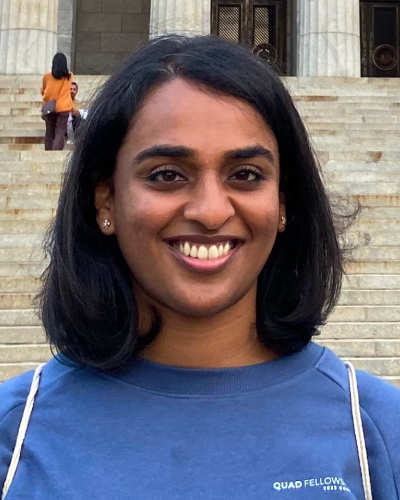
Divya Ramesh
Ph.D. Candidate, Computer Science and Engineering
My Work
Artificial Intelligence, commonly known as AI, has a lot of promise for society. However, we now have evidence that AI innovation has a long way to go before it benefits society in equitable ways. My research examines how we might govern AI innovation to ensure that its benefits are shared equitably in society. To do this, I combine human-centered design approaches in computer science with critical sociological analysis of AI systems. Such an approach enables us to not only examine structural barriers surrounding the development and use of AI systems, but also envision alternate futures. I also aim to supplement my research with advocacy to raise awareness around systemic issues of inequity in the field of computer science.
The Impact of the Barbour Scholarship
I feel incredibly honored to join the group of Barbour Scholars, all of whom have had inspiring journeys into and beyond graduate school. In addition, the Barbour Scholarship gives me ample resources and financial freedom to develop my own research vision for an equitable future. Most importantly, this fellowship instills a sense of courage and responsibility in me to ensure that that the communities in my home country also benefit from my research and scholarship.
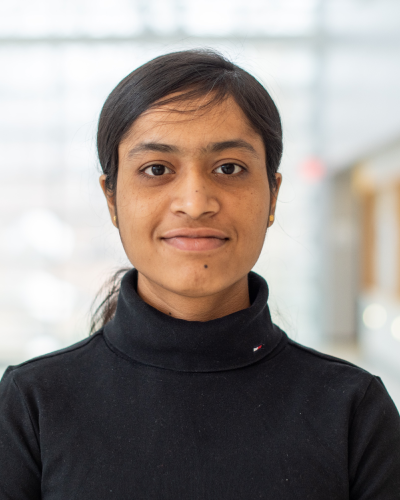
Anjali Devi Sivakumar
Ph.D. Candidate, Electrical and Computer Engineering
My Work
Insensible sweat, rich with valuable biomarkers and metabolites, shows immense potential as a diagnostic medium. It is often overshadowed by its more accessible counterpart, sensible sweat, its continuous and dynamic nature nonetheless positions it as an excellent candidate for integration into wearable diagnostic systems. The first part of my research introduces a hygrometer-based wearable device that measures insensible sweat rates, along with the ability to monitor skin dynamics. The second part of my work delves into the analysis of volatile organic compounds in insensible sweat, i.e., body odor, by developing wearable high-sensitivity, low-power micro-gas analyzers. In the subsequent phase of my research, these methods will be applied to disease diagnosis, spanning dermatology, acute care, pediatrics, food allergy, and pulmonary medicine. These analyzers offer the promise of seamless integration into everyday consumer electronics, thereby enabling early detection of a wide range of medical conditions often concealed by conventional methods.
The Impact of the Barbour Scholarship
Receiving the prestigious Barbour Scholarship not only helps me boost my professional profile for the next phase of my career but also acknowledges the importance of my research endeavors. This scholarship reinforces my confidence and ability to address more complex challenges in my field, empowering me to push boundaries and explore more innovative solutions. Moreover, it ignites within me a profound sense of passion and responsibility to inspire more aspiring women engineers, motivating them to explore interdisciplinary STEM fields.
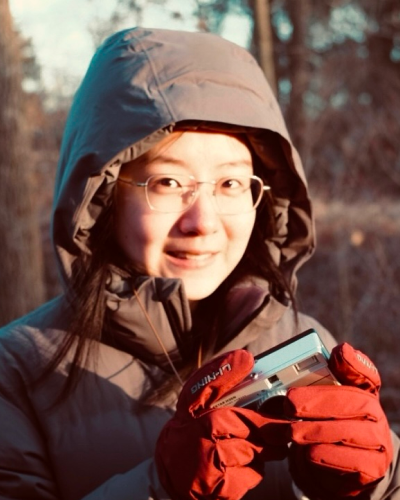
Yutong Xie
Ph.D. Candidate, Information
My Work
I have a general research interest in exploring the potential of artificial intelligence (AI) to support and drive innovation, with a specific focus on both scientific innovation and creativity endeavors. My research encompasses three key aspects: identifying the innovation space, devising computational methodologies for innovative solutions, and establishing robust criteria for evaluating these innovations.
A significant part of my work involves examining the synergistic relationship between AI and humans under the context of innovation as well as in broader scenarios. Particularly, I am interested in the problems of how to understand, align, and direct the behaviors of powerful AI such as large language models, which is crucial for fostering better human-AI collaborations.
The Impact of the Barbour Scholarship
Receiving the Barbour Scholarship is a pivotal moment in the final stage of my Ph.D. journey. This significant support enables me to dedicate my time and efforts entirely to my research, steering me closer to fulfilling my academic goals. The great recognition not only encourages me to keep pushing forward with the research topics that I am interested in, but also strengthens my determination to continue sharing my unique perspective as an Asian female scholar.

